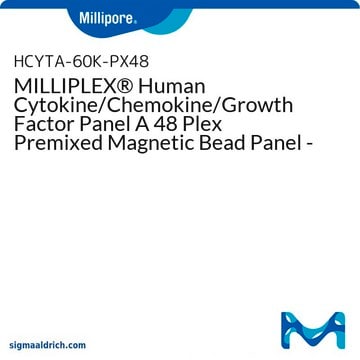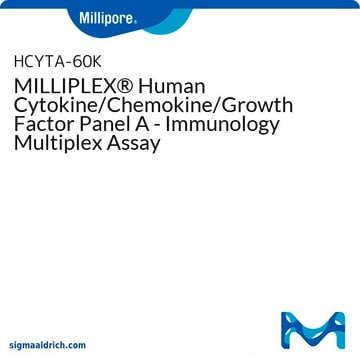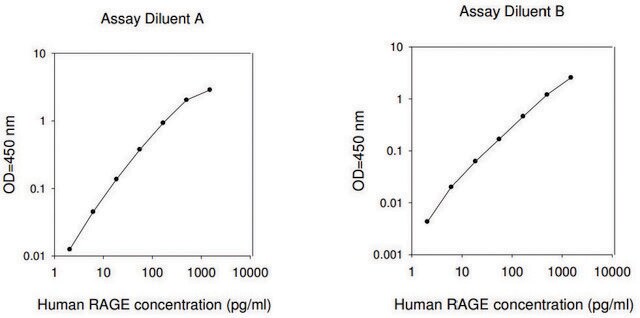MAGPMAG-24K
MILLIPLEX® Mouse Angiogenesis/Growth Factor Magnetic Bead Panel - Cancer Multiplex Assay
for the simultaneous quantification of multiple analytes
About This Item
Recommended Products
Quality Level
species reactivity
mouse
manufacturer/tradename
Milliplex®
assay range
accuracy: 90-104%
standard curve range: 1-1,000 pg/mL
(Endothelin-1)
standard curve range: 137-100,000 pg/mL
(Follistatin)
standard curve range: 137-100,000 pg/mL
(HGF)
standard curve range: 137-100,000 pg/mL
(SDF-1)
standard curve range: 14-10,000 pg/mL
(IL-1b)
standard curve range: 14-10,000 pg/mL
(Leptin)
standard curve range: 14-10,000 pg/mL
(MIP-1α)
standard curve range: 14-10,000 pg/mL
(sALK-1)
standard curve range: 14-10,000 pg/mL
(sCD31/ PECAM-1)
standard curve range: 27-20,000 pg/mL
(Angiopoietin-2)
standard curve range: 27-20,000 pg/mL
(EGF)
standard curve range: 27-20,000 pg/mL
(Endoglin)
standard curve range: 27-20,000 pg/mL
(MCP-1)
standard curve range: 27-20,000 pg/mL
(VEGF-C)
standard curve range: 3-2,000 pg/mL
(PLGF-2)
standard curve range: 6-4,000 pg/mL
(TNFα)
standard curve range: 6-4,000 pg/mL
(VEGF-A)
standard curve range: 69-50,000 pg/mL
(FGF-2/FGF-basic)
standard curve range: 69-50,000 pg/mL
(Prolactin)
standard curve range: 69-50,000 pg/mL
(VEGF-D)
standard curve range: 69-50,000 pg/mL
(sFasL)
standard curve range: 7-5,000 pg/mL
(Amphiregulin)
standard curve range: 7-5,000 pg/mL
(Betacellulin)
standard curve range: 7-5,000 pg/mL
(G-CSF)
standard curve range: 7-5,000 pg/mL
(IL-17A)
standard curve range: 7-5,000 pg/mL
(IL-6)
standard curve range: 7-5,000 pg/mL
(KC/CXCL1)
technique(s)
multiplexing: suitable
detection method
fluorometric (Luminex xMAP)
shipped in
wet ice
General description
MILLIPLEX® Mouse Angiogenesis//Growth Factor Panel, is a 24-plex (for serum/plasma) or 27-plex (for cell culture) kit to be used for the simultaneous quantification of the following analytes: Angiopoietin-2, G-CSF, sFasL, sAlk-1, Amphiregulin, Leptin, IL-1b, Betacellulin, EGF, IL-6, Endoglin, Endothelin-1, FGF-2, Follistatin, HGF, PECAM-1, IL-17, PLGF-2, KC, MCP-1, Prolactin, MIP-1a, SDF-1, VEGF-C, VEGF-D, VEGF-A, and TNFα. This kit uses a 96-well format, contains a lyophilized standard cocktail, two internal assay quality controls and can measure up to 38 samples in duplicate.
The Luminex® xMAP® platform uses a magnetic bead immunoassay format for ideal speed and sensitivity to quantitate multiple analytes simultaneously, dramatically improving productivity while conserving valuable sample volume.
Panel Type: Circulating Cancer
Specificity
Application
- Analytes: sALK-1, Amphiregulin, Angiopoietin-2, Betacellulin, sCD31/sPECAM-1, EGF, Endoglin, Endothelin-1, sFasL, FGF-2 (FGF-basic), Follistatin (FST), G-CSF, HGF, IL-1β, IL-6, IL-17A (CTLA8), KC (GRO/CINC-1/CXCL1), Leptin, MCP-1 (CCL2), MIP-1α (CCL3), Placental Growth Factor 2 (PLGF-2), Prolactin, SDF-1 (CXCL12), TNF-α, VEGF-A, VEGF-C, VEGF-D
- NOTE: Angiopoeitin-2, Betacellulin, and PECAM-1 should not be run in serum/plasma samples
- Recommended Sample Type: Mouse serum, plasma or tissue/cell culture supernatants or lysates
- Recommended Sample Dilution: 25 μL per well of diluted serum or plasma; cell/tissue culture samples may require diltion in appropriate control medium
- Assay Run Time: Overnight (16-20 hours) at 2-8°C
- Research Category: Cancer
Features and Benefits
Packaging
Storage and Stability
Other Notes
Legal Information
Disclaimer
Signal Word
Danger
Hazard Statements
Precautionary Statements
Hazard Classifications
Acute Tox. 4 Dermal - Acute Tox. 4 Inhalation - Acute Tox. 4 Oral - Aquatic Chronic 2 - Eye Dam. 1 - Skin Sens. 1 - STOT RE 2
Target Organs
Respiratory Tract
Storage Class Code
10 - Combustible liquids
Certificates of Analysis (COA)
Search for Certificates of Analysis (COA) by entering the products Lot/Batch Number. Lot and Batch Numbers can be found on a product’s label following the words ‘Lot’ or ‘Batch’.
Already Own This Product?
Find documentation for the products that you have recently purchased in the Document Library.
Related Content
MILLIPLEX® panel enables efficient angiogenesis biomarker quantification for NSCLC metastatic progression correlation.
MILLIPLEX® panel enables efficient angiogenesis biomarker quantification for NSCLC metastatic progression correlation.
MILLIPLEX® panel enables efficient angiogenesis biomarker quantification for NSCLC metastatic progression correlation.
MILLIPLEX® panel enables efficient angiogenesis biomarker quantification for NSCLC metastatic progression correlation.
Our team of scientists has experience in all areas of research including Life Science, Material Science, Chemical Synthesis, Chromatography, Analytical and many others.
Contact Technical Service











